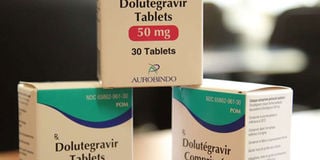New study links birth defects to HIV drug

Dolutegravir, the anti-retroviral drug of choice for those living with HIV. PHOTO | AFP
What you need to know:
- Dolutegravir was authorised in the US in 2013 and in the European Union in 2014.
- Dolutegravir works by blocking an HIV enzyme to prevent the virus from multiplying, thereby reducing the amount of virus in the body.
- Neural tube defects can occur early in pregnancy when the spinal cord, brain, and related structures fail to form properly.
US and European drug regulators have warned that a generic version of an antiretroviral drug can cause birth defects in pregnant women.
The frontline drug, dolutegravir, was launched in Kenya mid-last year at a time the country was ramping up the fight against HIV/Aids.
Dolutegravir (or DTG), manufactured by GlaxoSmithKline (GSK), was made available to patients through a partnership between the Ministry of Health and Geneva-based Unitaid.
The generic version is sold under the brand name Tivicay and costs about Sh403 for a 30-day pack. Prior to its introduction, patients paid between Sh5,045 and Sh6,054 for a pack.
Dolutegravir was authorised in the US in 2013 and in the European Union in 2014.
BLOCKING HIV ENZYME
The drug works by blocking an HIV enzyme to prevent the virus from multiplying, thereby reducing the amount of virus in the body.
Kenya was the second country in Africa to launch the drug as a core medicine for newly diagnosed patients, after Botswana in 2016.
Tivicay was being made available to patients in sub-Saharan Africa in 2016 as a first-line treatment.
But the international regulators have warned that new studies indicate women who take the drug at the time of conception or during the first trimester of pregnancy are at higher risk of giving birth to babies with neural tube defects.
Neural tube defects can occur early in pregnancy when the spinal cord, brain, and related structures fail to form properly.
BIRTH CONTROL
“Women of childbearing age who decide to take a dolutegravir-containing regimen should consistently use effective birth control (contraception) while on HIV treatment,” noted the regulators in press statements.
The World Health Organisation has advised against using the drug during pregnancy or breast-feeding due to insufficient safety.
Meanwhile, GSK said it was notifying doctors of the issue and working with healthcare authorities to better understand the potential risk.
“There is no known mechanism linking dolutegravir with these types of birth defects and there are no relevant findings in pre-clinical studies,” GSK said in a statement.





